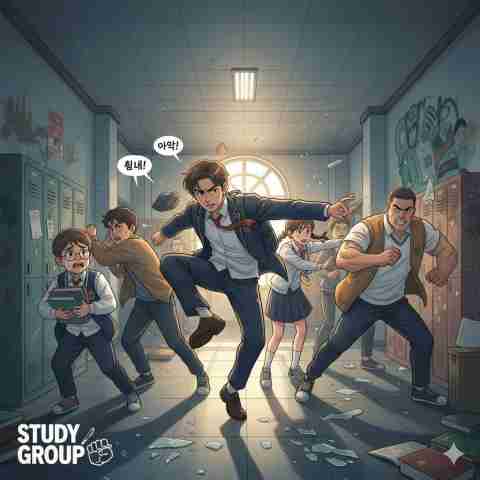Why “Study Group” (2025) Is the K-Drama Everyone’s Talking About
School Action, Empathy, and the Power of Resilience
“Study Group” (2025) has become a cultural phenomenon, captivating audiences worldwide with its unique blend of school action and heartfelt coming-of-age narratives. As a Korean drama, it stands at the forefront of a new trend in K-dramas, merging high-stakes intensity with empathetic storytelling. With a current IMDb user score of 8.3/10 from over 5,200 users, “Study Group” has quickly established itself as a must-watch.
Key Takeaways
- Unique Genre Fusion: “Study Group” combines the grit of action with the emotional depth of youth stories, creating a refreshing take on the school drama genre.
- Social Commentary: The drama reflects the harsh realities faced by many Korean students, including academic pressure, social adversity, and the struggle for self-worth.
- Adaptation Success: Adapted from a popular Korean webtoon, “Study Group” brings the beloved school-action genre from digital pages to the global streaming audience.
Table of Contents
- Introduction: A New Wave in Korean Dramas
- The Story: More Than Just a Fight to Study
- Why “Study Group” Resonates: Empathy, Action, and Social Relevance
- The Cast: Star Power and Fandom
- Key Themes: Underdog Grit, Teamwork, and Hope
- Why “Study Group” Is Trending: Data and Audience Response
- What Sets “Study Group” Apart: Unique Premise and Genre Fusion
- Empathy and Real-World Relevance: Why Audiences Connect
- Actionable Takeaways: What “Study Group” Teaches Us
- The Future: “Study Group” and the Rise of School-Action Dramas
- Final Thoughts: Why You Should Watch “Study Group”
Introduction: A New Wave in Korean Dramas
The 2025 Korean drama “Study Group” has become a phenomenon, captivating audiences both domestically and worldwide. This school-action series stands at the forefront of a new trend in K-dramas, merging the high-stakes intensity of action with the heartfelt journey of coming-of-age narratives. With a current IMDb user score of 8.3/10 from over 5,200 users, “Study Group” has quickly established itself as a must-watch.
“Study Group” follows Yun Ga Min, a seemingly model student at Korea’s lowest-ranked high school. Despite his relentless dedication to academics, Ga Min’s grades never improve. What sets him apart, however, is his exceptional physical strength and fighting prowess—a stark contrast to his bookish appearance.
The Story: More Than Just a Fight to Study
At its heart, “Study Group” follows Yun Ga Min, a seemingly model student at Korea’s lowest-ranked high school. Despite his relentless dedication to academics, Ga Min’s grades never improve. What sets him apart, however, is his exceptional physical strength and fighting prowess—a stark contrast to his bookish appearance.
Determined to change his fate and pursue college, Ga Min forms a study group with other struggling students. Their journey is far from ordinary: in a school dominated by violence, Ga Min must protect his friends from bullies, using his fighting skills to shield them from harm. The group’s efforts to study and survive in this hostile environment create a narrative that is as thrilling as it is deeply empathetic.
Why “Study Group” Resonates: Empathy, Action, and Social Relevance
“Study Group” is part of a growing movement in K-dramas that combines the grit of action with the emotional depth of youth stories. Unlike typical school dramas centered on romance or comedy, this series places students in real danger, making the classroom a literal battleground. The result is a refreshing take that broadens the genre’s appeal, particularly for viewers seeking stories of underdog triumph and perseverance.
The show’s narrative reflects the harsh realities faced by many Korean students: academic pressure, social adversity, and the struggle for self-worth in a competitive environment. By portraying Ga Min’s fight—both academically and physically—the drama sparks conversations about the pressures within the education system, bullying, and the resilience required to overcome such obstacles.
The Cast: Star Power and Fandom
The ensemble cast features Hwang Min-hyun, Han Ji-Eun, and Cha Woo-min—all of whom bring significant star power and established fandoms to the series. Hwang Min-hyun, in particular, draws attention from K-pop fans, having previously been a member of NU’EST and Wanna One. Their performances add authenticity and emotional depth, making the characters’ struggles and victories resonate on a personal level.
Key Themes: Underdog Grit, Teamwork, and Hope
Ga Min’s journey is one of relentless determination. Despite his academic setbacks, he refuses to give up, embodying the spirit of the underdog. His willingness to fight for his friends—not just academically but physically—turns the study group into a symbol of solidarity and hope.
The drama emphasizes the importance of community. Each member of the study group brings unique strengths, and their collective effort is what enables them to face adversity. This focus on teamwork stands in contrast to the often individualistic narratives found in similar genres.
Why “Study Group” Is Trending: Data and Audience Response
With an IMDb rating of 8.3/10 and over 5,200 reviews, “Study Group” is outperforming many new K-dramas in 2025. The drama is trending across platforms like Twitter/X, TikTok, and YouTube, with hashtags such as #StudyGroupKDrama driving engagement. Early reports highlight strong international streaming numbers, especially on platforms like Disney+ and Netflix, both of which have prioritized school-action dramas in their acquisition strategies.
What Sets “Study Group” Apart: Unique Premise and Genre Fusion
“Study Group” subverts expectations by fusing real academic stress with kinetic action. The stakes are not just emotional but physical, transforming the typical school drama into a space where survival and success are intertwined. Critics and fans alike praise the drama for its seamless blend of coming-of-age storytelling and action cinema.
Empathy and Real-World Relevance: Why Audiences Connect
“Study Group” strikes a chord with viewers who have experienced academic pressure, bullying, or the feeling of being an outsider. The show’s portrayal of students fighting—literally and figuratively—for a better future inspires empathy and reflection. Its social commentary on education and youth resonates not just in Korea but with global audiences facing similar challenges.
Actionable Takeaways: What “Study Group” Teaches Us
- Resilience Pays Off: Ga Min’s journey reminds viewers that persistence, even in the face of repeated failure, can lead to unexpected victories.
- Community Matters: The power of collective effort and mutual support is a recurring theme, encouraging viewers to seek out and nurture supportive relationships.
- Challenge the Status Quo: By refusing to accept the limitations of his environment, Ga Min inspires others to question and challenge the systems that hold them back.
- Hope Is Contagious: The optimism and determination of the main characters have a ripple effect, inspiring change not just within the school but in the broader community.
The Future: “Study Group” and the Rise of School-Action Dramas
The success of “Study Group” is likely to influence future K-drama productions, with more series expected to explore the intersection of youth, action, and social commentary. Its popularity signals a shift in audience preferences, with viewers seeking stories that are both thrilling and deeply human.
Final Thoughts: Why You Should Watch “Study Group”
For fans of Korean dramas, youth stories, or action-packed narratives, “Study Group” offers a compelling blend of excitement and empathy. Its high ratings, engaging cast, and timely themes make it a standout in the 2025 drama landscape. As the series continues its run, expect ongoing discussion and a surge in similar productions aimed at young, global audiences hungry for gripping, underdog-driven stories.
For more in-depth reviews and updates on the latest Korean dramas, stay tuned to our blog and follow our coverage of the 2025 K-drama wave.
Sources: IMDb, Whalien Isle K-Drama Review, YouTube Recaps


